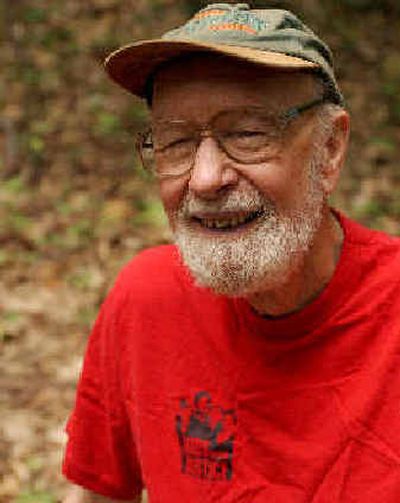Dean of American folk singers

The voice on the other end of the line sounds a bit winded at first, making one wonder whether the years are finally catching up with the dean of American folk singers.
But then Pete Seeger explains that he’s just spent the better part of the afternoon outside, building a new fence around his home in the mountains of rural upstate New York.
These are busy times for Seeger, who has more on his plate than just building fences, or chopping wood — which he also does regularly at age 85.
A member of the Songwriters Hall of Fame and the Rock and Roll Hall of Fame, a Grammy winner and the composer of hundreds of songs including such American classics as “If I Had a Hammer,” “Turn Turn Turn” and “Where Have All the Flowers Gone,” Seeger has never been one to slow down.
He spent his Father’s Day weekend, as he does every year, working at the Clearwater Festival, the annual musical event he formed 36 years ago to help clean up New York’s Hudson River.
Then there are occasional concert engagements with Arlo Guthrie, son of his old friend, Woody Guthrie, and his on-again, off-again singing partner since the 1960s.
Seeger recently recorded a new song, “Take It From Dr. King,” a tribute to Martin Luther King.
“I don’t expect it to be widely sung, but I think on Dr. King’s birthday it will get sung in schools and churches and played on radio stations,” he says. “It’s a jazzy little song.
“But I’m not trying to record any more. As a matter of fact, the only reason I made this record was because I had a whole batch of other people to help me do it.”
Time is beginning to take its toll, he allows.
“I’m becoming just a little bit creaky, like most folks my age,” Seeger says. “But I get more exercise than most city people do because I’ve got to provide firewood for the house here and right now I’m trying to put up a fence around the garden so that the local deer don’t get in.
“So I’m in better condition than most people my age. At least from the shoulders down,” he says with a chuckle. “From the shoulders up, I’m only about a quarter there. I can remember lyrics from songs I sung 60 years ago. But what happened to me last week I’d have a little trouble telling you.”
As for his performing skills, Seeger says, “My singing voice is about 95 percent gone now. But I can still get an audience singing because I’m a lifelong song leader.
“I do what they do in church. They call it lining out the hymn. I tell people, ‘You know this song’ (as he starts singing Woody Guthrie’s ‘This Land is Your Land’). Then I feed them the words: ‘As I was walking. That ribbon of highway. I saw above me. I saw below me.’ I just need to hint at the words and the audience sings.”
He met the elder Guthrie in 1940 through actor Will Geer, who put on a concert to benefit California agricultural workers.
“On stage were Leadbelly, Josh White, an American square dance group my wife was dancing in, and a person who was a stranger to everybody in New York, a little curly-haired guy named Woody Guthrie.
“He had to come back again and again, they wouldn’t let him off the stage. He’d tell a little story, sing a song, tell another little story, sing another song.”
What does he think has kept Guthrie’s music — and his own — in front of the public for so long?
“Woody set the tone for it well,” Seeger says. “It’s been a half-century since he went into a hospital and people are still singing his songs.
“And the most important work I did in my life since then was go from college to college to college and sing some of Woody’s songs. And Leadbelly’s, too. And let them know there is a lot of music in this country that never gets played on the radio.”